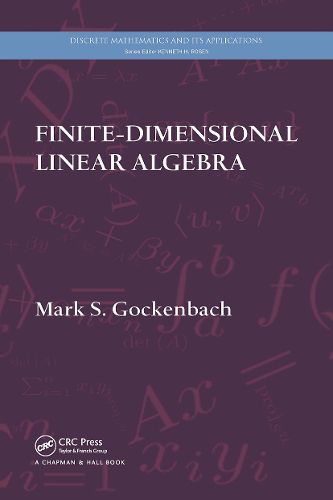Readings Newsletter
Become a Readings Member to make your shopping experience even easier.
Sign in or sign up for free!
You’re not far away from qualifying for FREE standard shipping within Australia
You’ve qualified for FREE standard shipping within Australia
The cart is loading…






Linear algebra forms the basis for much of modern mathematics-theoretical, applied, and computational. Finite-Dimensional Linear Algebra provides a solid foundation for the study of advanced mathematics and discusses applications of linear algebra to such diverse areas as combinatorics, differential equations, optimization, and approximation.
The author begins with an overview of the essential themes of the book: linear equations, best approximation, and diagonalization. He then takes students through an axiomatic development of vector spaces, linear operators, eigenvalues, norms, and inner products. In addition to discussing the special properties of symmetric matrices, he covers the Jordan canonical form, an important theoretical tool, and the singular value decomposition, a powerful tool for computation. The final chapters present introductions to numerical linear algebra and analysis in vector spaces, including a brief introduction to functional analysis (infinite-dimensional linear algebra).
Drawing on material from the author's own course, this textbook gives students a strong theoretical understanding of linear algebra. It offers many illustrations of how linear algebra is used throughout mathematics.
$9.00 standard shipping within Australia
FREE standard shipping within Australia for orders over $100.00
Express & International shipping calculated at checkout
Linear algebra forms the basis for much of modern mathematics-theoretical, applied, and computational. Finite-Dimensional Linear Algebra provides a solid foundation for the study of advanced mathematics and discusses applications of linear algebra to such diverse areas as combinatorics, differential equations, optimization, and approximation.
The author begins with an overview of the essential themes of the book: linear equations, best approximation, and diagonalization. He then takes students through an axiomatic development of vector spaces, linear operators, eigenvalues, norms, and inner products. In addition to discussing the special properties of symmetric matrices, he covers the Jordan canonical form, an important theoretical tool, and the singular value decomposition, a powerful tool for computation. The final chapters present introductions to numerical linear algebra and analysis in vector spaces, including a brief introduction to functional analysis (infinite-dimensional linear algebra).
Drawing on material from the author's own course, this textbook gives students a strong theoretical understanding of linear algebra. It offers many illustrations of how linear algebra is used throughout mathematics.